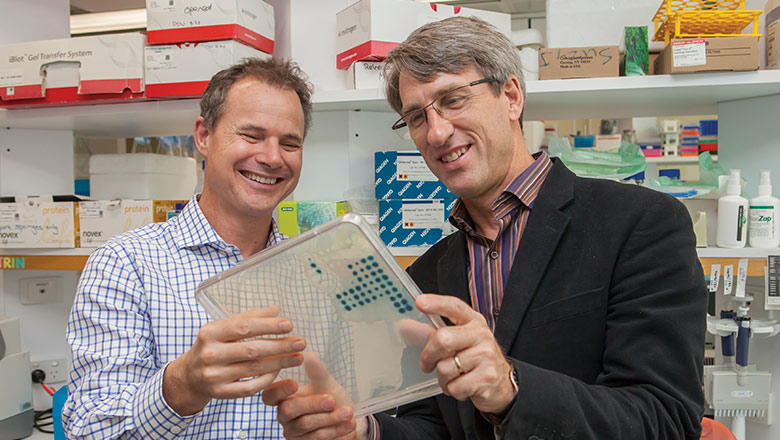 Our researchers at the new frontier of drug discovery
Our researchers at the new frontier of drug discovery
Finding a far more reliable “piggyback ride” for smart drugs that can penetrate deep into cells and attack their disease targets in the cytoplasm or nucleus while causing fewer side effects, has been a major breakthrough made by The Kids Research Institute Australia’s Drug Discovery Unit.
Already these rare ride-offering cell penetrating Phylomer (CPPs) peptides, derived from the genomes of ancient bacteria and identified by local Institute researchers, have been shown to transport cancer-fighting inhibitors that turn off a key “master regulator switch” for cancer, known as the Myc protein.
“Myc is a kind of ‘Holy Grail’ target in cancer,” said Dr Paul Watt. “People have been wanting to hit it with drugs for a long time, because it is known that many cancers become ‘addicted’ to the Myc protein and can’t survive without it.
It is a really important target for many types of cancer, including lymphomas, leukaemia and brain cancers.”
Around a hundred billion compounds had to be genetically screened by the Institute to pinpoint less than 100 CPP peptides capable of “piggy backing” these safer cutting-edge smart drugs called biologics.
Biologics drugs, which include antibodies and toxins, are known to have fewer side effects and better binding capabilities than conventional drugs. However biologics are unable to penetrate into cells by themselves, which means they are unable to access the majority of drug targets (80%) which are found inside cells.
While other less-effective cell penetrating peptides have been used to transport biologics into cells, most remain trapped due to intracellular vesicles called endosomes and are unable to access the disease-causing targets.
Institute researchers Dr Paul Watt and Dr Richard Hopkins said they first realised they were on to “something big” when pharmaceutical industry giants Janssen (Johnson & Johnson) and Genentech (Roche) requested to join in on their work and access the new intracellular delivery method.
“We’ve already exceeded the efficiency of the gold standard intracellular delivery peptides by 37 to 160-times using our cell penetrating Phylomers,” said Dr Hopkins.
“This outcome allows us to make the bold claim we have the world’s best-in-class peptides for delivering smart drugs inside cells.”
“Also, because the technology can deliver smart drugs to any disease target inside cells, it is not restricted to cancer. Many diseases involve deleterious combinations of proteins inside cells which could be targeted with this approach.”
The Drug Discovery Unit is now focused on research translation and drug discovery through its public biotechnology company Phylogica Limited. This company is a spin out from The Kids Research Institute Australia and the US-based Fox Chase Cancer Centre in Philadelphia.
Phylogica has generated libraries containing over 400 billion unique natural peptides, optimised by evolutionary selection to adopt stable drug-like structures.
“These peptides come from the genomes of biodiverse bacteria which have been evolving for billions of years,” said Dr Watt.
“Their genes are so diverse because the microbes live in such diverse environments as deep sea volcanic vents, geysers and salt lakes.”
“By making peptide libraries derived from these diverse organisms, we end up with very high quality ‘lego blocks’, which include virtually every shape found in nature that has been designed for the ability to bind to other proteins.”
“Effectively we can now screen all of the structures developed by nature in a test tube.”
Phylogica offers drug discovery services to the pharmaceutical industry, allowing others to utilise libraries and screening technologies in exchange for licence fees, milestones and royalties. The company has entered into discovery alliances with several of the largest global pharmaceutical companies. In the past five years, this has included Roche, MedImmune, Pfizer, Janssen, Cubist Pharmaceuticals and the Roche subsidiary Genentech.
What’s next?
“Now that we have a handle on how to deliver smart drugs efficiently into cells, we are developing our own smart drugs against targets that have proved unreachable with conventional drugs,” said Dr Hopkins. “In many respects, the ability to deliver a new generation of drugs inside cells represents the last frontier in medicine and we’re excited to be at the forefront of developments in this field.”
